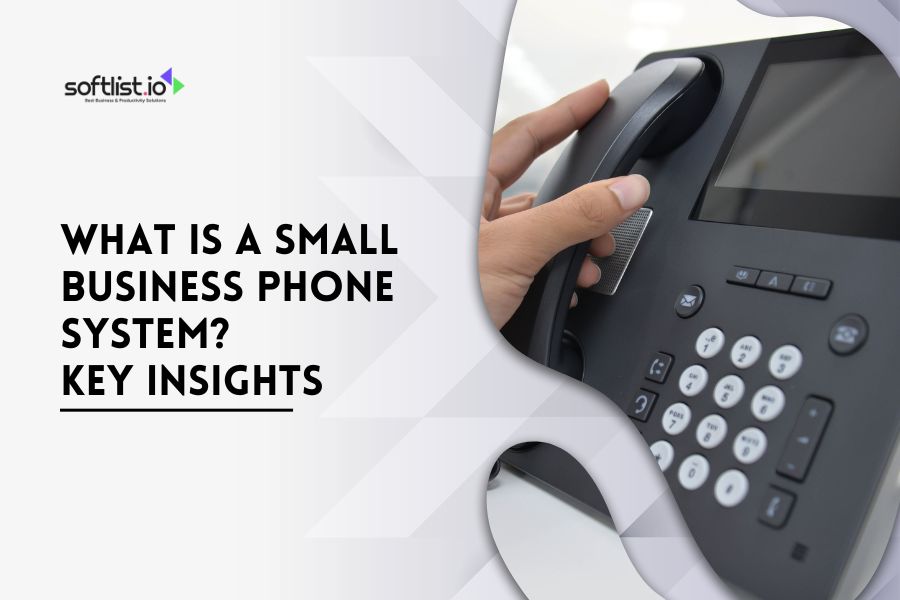It’s important to pick the right phone system for your business. It makes it easier to talk to each other, gets more done, and gives better customer service. In this article, we will talk about what business phone systems are, why they are important, and the different kinds that are out there.
We’ll also talk about the best network options for small businesses, how smartphones can help with business, and some useful apps for phones. Know these things, and you’ll be better able to make choices that are best for your business. A good phone system is important for any business, no matter how big or small it is.
Here are some of the different kinds of phone systems you can get. We’ll help you choose the best one for your business.
What Are Business Phone Systems?

Source: Canva Pro
A business phone system is a network of phones used by businesses to manage their internal and external communication. It integrates various telephony features and capabilities to support the specific communication needs of a business. There are different types of phone systems, each with its own unique features and benefits.
Definition and Overview
A business phone system is designed to handle multiple phone lines and extensions, allowing employees to communicate efficiently. These systems typically offer features like call forwarding, voicemail, auto attendants, and conferencing. They can range from traditional landline systems to advanced VoIP (voice over Internet protocol) systems.
- VoIP Systems: VoIP phone systems use the internet to transmit calls, making them a cost-effective and flexible option for businesses. They offer advanced features like call routing, voicemail-to-email, and video conferencing.
- Traditional Phone Systems: These systems use analog lines and are reliable, but may lack the advanced features of VoIP systems.
- Cloud-Based Phone Systems: These systems are hosted on the cloud, offering flexibility and scalability. They are ideal for businesses with remote or mobile employees.
Key Components
- Desk phones and IP phones: These are the physical devices used to make and receive calls. IP phones are used in VoIP systems, while desk phones are common in traditional setups.
- PBX Systems: A Private Branch Exchange (PBX) system is used to manage internal calls and connect them to external lines.
- VoIP Service Providers: Companies like Ooma Office and Zoom Phone offer VoIP services with various features and service plans.
- Cloud Phone Systems: Providers like Google Workspace offer cloud-based phone systems that integrate with other business tools.
What is the Importance of a Phone System in a Business?

Source: Canva Pro
A business phone system is crucial for any business as it directly impacts communication efficiency, customer service, and overall productivity.
Enhanced Communication
An efficient business phone system improves both internal and external communication. For small businesses, clear and reliable communication is vital for growth and customer satisfaction.
- Internal Communication: Features like call forwarding, conferencing, and intercom help employees communicate seamlessly, improving collaboration and productivity.
- External Communication: A dedicated business phone number and professional phone service enhance customer interactions. Features like auto attendants and call routing to ensure that customer calls are directed quickly to the right departments.
Increased Productivity
A good business phone system streamlines workflow and saves time. Features like voicemail-to-email and call forwarding help employees manage their communications efficiently, even when they are away from their desks.
- Auto Attendants: These systems automatically greet and route calls, saving time and reducing the need for a receptionist.
- Call Routing: Ensures that calls are directed to the appropriate person or department, minimizing wait times and improving customer satisfaction.
- Voicemail Management: Employees can access voicemails through their email, ensuring they never miss important messages.
Professionalism and Customer Trust
Using a business phone system projects a professional image, which is essential for gaining and retaining customer trust.
- Business Phone Numbers: A dedicated business phone number separates personal and business calls, making the business appear more professional.
- Call Management Features: Features like call recording and detailed call logs help maintain high standards of customer service.
What are the Different Types of Phone Systems?

Source: Canva Pro
There are several types of phone systems available for businesses, each catering to different needs and preferences. Understanding these systems can help small business owners choose the best solution for their communication needs.
Traditional Landline Systems
These systems use physical telephone lines to connect calls. They are known for their reliability and are often used by businesses that require a stable and consistent connection.
- Pros: reliable, familiar technology, minimal downtime.
- Cons: limited features compared to VoIP systems; higher costs.
VoIP Phone Systems
VoIP systems use the internet to make and receive calls. They are popular among small businesses due to their cost-effectiveness and advanced features.
- Pros: lower costs; advanced features like call forwarding and video conferencing; scalable.
- Cons: Dependent on internet connection quality; potential security concerns.
Cloud-Based Phone Systems
These business phone systems are hosted in the cloud and provide flexibility and scalability. They are ideal for businesses with remote or mobile employees and offer seamless integration with other cloud-based tools.
- Pros: Scalability, flexibility, and accessibility from any device with an internet connection.
- Cons: ongoing subscription costs; potential data security issues.
Virtual Phone Systems
Virtual phone systems allow businesses to manage their communications through a virtual platform, often integrating mobile phones into the business communication network.
- Pros: cost-effective, mobile-friendly, ideal for remote work.
- Cons: Limited features compared to full PBX or VoIP systems.
What is the Best Network for a Small Business?

Source: Canva Pro
Choosing the right network is crucial for the efficiency and reliability of a small business phone system. The network infrastructure forms the backbone of business communication, particularly for modern VoIP and cloud-based systems.
Network Types
There are two primary types of networks to consider for a small business phone system: wired and wireless networks. Each has its advantages and disadvantages.
- Wired Networks: These use physical cables (ethernet) to connect devices.
- Pros: reliable, consistent connection; generally more secure.
- Cons: limited mobility; more challenging to install and maintain.
- Wireless Networks (Wi-Fi): These provide connectivity through wireless signals.
- Pros: greater flexibility and mobility; easier to set up.
- Cons: The potential for interference may require more security measures.
Choosing the Right Network
When selecting the best network for your small business phone system, consider the following factors:
- Bandwidth: Ensure sufficient bandwidth to support multiple simultaneous calls, especially if using a VoIP phone service.
- Reliability: Choose a network that offers high uptime and stability to prevent communication disruptions.
- Security: Implement robust security protocols to protect sensitive business communications.
- Scalability: Select a network that can grow with your business, easily accommodating new phones and increased traffic.
For many small businesses, a hybrid approach that combines both wired and wireless networks can provide the best balance of reliability and flexibility.
What are Smartphones Used for in Business?
Smartphones play a pivotal role in modern business operations, providing flexibility and connectivity that traditional office phone systems cannot match.
Mobile Communication
Smartphones allow employees to stay connected and productive, even when they are not at their desks. This mobility is particularly beneficial for small businesses and startups that need to maximize efficiency.
- On-the-Go Communication: Smartphones enable employees to make and receive calls, send emails, and manage tasks from anywhere.
- Business Apps: Applications like Slack, Zoom, and Microsoft Teams facilitate real-time collaboration and communication.
- Remote Work: Smartphones support remote work by allowing employees to access business systems and data from any location.
Integration with Business Systems
Smartphones can integrate seamlessly with other business phone systems, enhancing overall productivity and operational efficiency.
- VoIP and Cloud-Based Systems: Many VoIP providers offer mobile apps that extend the functionality of your office phone system to your smartphone.
- CRM Integration: Mobile CRM apps help manage customer relationships and sales processes on the go.
- Business Analytics: Mobile access to analytics tools provides real-time insights into business performance, helping to make informed decisions.
What Mobile App is Most Useful to Your Business?
The right mobile apps can significantly enhance business operations, from communication to project management and customer relationship management.
Productivity Apps
Productivity apps help streamline business processes, improve time management, and boost overall efficiency.
- Microsoft Teams is an all-in-one collaboration app that integrates chat, video conferencing, and file sharing.
- Trello is a project management tool that helps teams organize tasks and collaborate efficiently.
- Evernote is a note-taking app that allows you to capture, organize, and share information easily.
Communication Apps
Effective communication is vital for business success. Communication apps ensure that teams can stay connected and collaborate effectively, regardless of location.
- Zoom is a leading video conferencing app that supports virtual meetings, webinars, and conference calls.
- Slack is a messaging app designed for team communication, with channels for different topics and integration with numerous other tools.
- Google Workspace: A suite of productivity and collaboration tools, including Gmail, Google Drive, Google Docs, and Google Meet.
Key Features to Look For
When selecting mobile apps for your business, consider the following features to ensure they meet your needs:
- Integration: Apps that integrate with your existing systems and tools can streamline workflows and improve efficiency.
- Ease of Use: Choose apps that are user-friendly and require minimal training.
- Security: Ensure the apps have robust security features to protect sensitive business data.
- Scalability: Select apps that can grow with your business, offering advanced features and additional capacity as needed.
Final Thoughts
Choosing the right phone system for small businesses is crucial to ensuring efficient communication, a professional image, and business growth. A good business phone solution includes features like call forwarding, voicemail, auto attendants, and integrations with business apps like Google Workspace.
Business VoIP systems are popular due to their cost-effectiveness, scalability, and advanced features.
Whether you opt for a traditional telephone system, a VoIP phone service, or a cloud-based phone system, it’s important to choose a solution that aligns with your business needs. Small and medium-sized businesses benefit from systems that offer flexibility, reliability, and ease of use.
As your business grows, ensure that your phone system can scale with you, adding new phone lines and features as needed.
Remember, a secure business phone system not only improves communication but also enhances customer trust and business continuity. Whether you are new to VoIP or when looking to upgrade your existing setup, evaluating all phone system options is essential to making an informed decision that will help your business thrive.
Secure your communications. Discover Softlist’s ‘Cyber Security Services‘ category for robust solutions that protect your phone system from threats and vulnerabilities. Unlock incredible value. Check out Softlist’s ‘Deals and Offers‘ page for the latest discounts and special offers on premium products.
Frequently Asked Questions (FAQs)
What are The Essential Features of a Business Phone System?
A good business phone system includes features such as call forwarding, voicemail, auto attendants, multi-line phone management, business texting, virtual phone numbers, and integration with business apps. These features help streamline business communication and improve customer service.
How Much Does a Business Phone System Typically Cost?
The cost of a business phone system varies depending on the type and provider. VoIP services are generally more affordable, with prices ranging from $20 to $50 per user per month. Traditional analog phone systems may have higher setup and maintenance costs.
Can Small Businesses Benefit From Cloud-Based Phone Systems?
Yes, cloud-based phone systems offer flexibility, scalability, and advanced features. They are ideal for small businesses that need to support remote work and want to avoid the high costs associated with traditional telephone systems.
What is the Best VoIP Provider for Small Businesses?
Top VoIP providers for small businesses include Ooma Office, Zoom Phone, and RingCentral. These providers are known for their reliability, extensive features, and scalability, making them a great choice for growing businesses.
How do I Choose the Right Business Phone System For My Company?
To choose the right business phone system, consider your specific business needs, the features offered by the provider, cost, scalability, and customer support. Look for systems that offer free trials so you can test the service before committing.
Ensure the system can integrate with your existing business tools and can scale as your business grows.






